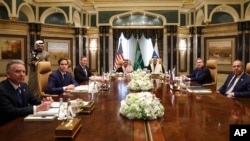Top U.S. and Russian diplomats met for several hours Tuesday in Saudi Arabia about relations between their countries and a potential end to Russia’s war in Ukraine.
Both sides tempered expectations ahead of time, describing the talks as an initial step that could lay the framework for direct talks between U.S. President Donald Trump and Russian leader Vladimir Putin.
Secretary of State Marco Rubio led the U.S. delegation, which included national security adviser Mike Waltz and Middle East envoy Steve Witkoff.
Russia’s side included Foreign Minister Sergey Lavrov and senior Putin aide Yuri Ushakov.
Ukrainian leaders said they were not invited to participate. Ukrainian President Volodymyr Zelenskyy is due to host the U.S. envoy for Ukraine, Keith Kellogg, for talks on Wednesday.
The U.S.-Russia engagement sparked concern among European leaders who in recent days have highlighted the need for Ukraine to be involved in discussions about its own future, and for European nations to play a role in what they also see as a key development in their own security.
French President Emmanuel Macron convened a group of European leaders for a Monday session in Paris where they discussed boosting defense spending and potential security guarantees for Ukraine.
There was division on the idea of deploying peacekeepers to Ukraine as part of a potential end to the war, with governments such as Britain and Sweden expressing openness to the idea while German Chancellor Olaf Scholz said that discussion was premature.
“We seek a strong and lasting peace in Ukraine. To achieve this, Russia must end its aggression, and this must be accompanied by strong and credible security guarantees for the Ukrainians,” Macron said on X.
The French leader said he had spoken with Trump and Zelenskyy after the Paris talks, and that it is important for Europeans, Americans and Ukrainians to work together.
Zelenskyy expressed a need for “robust and reliable” security guarantees, saying that otherwise Russia will just start another war with Ukraine or other nations in Europe.





